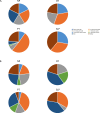REhabilitation Approaches in CHildren with cerebellar mutism syndrome (REACH): An international cross-disciplinary survey study
- PMID: 38393929
- PMCID: PMC11307050
- DOI: 10.3233/PRM-230006
REhabilitation Approaches in CHildren with cerebellar mutism syndrome (REACH): An international cross-disciplinary survey study
Abstract
Objective: Pediatric cerebellar mutism syndrome (pCMS) can occur following resection of a posterior fossa tumor and, although some symptoms are transient, many result in long-lasting neurological deficits. A multi-disciplinary rehabilitation approach is often used in cases of pCMS; however, there have been no clinical trials to determine gold standards in rehabilitation practice in this population, which remains a research priority. The purpose of this study was to identify and compare intervention practices used in pCMS throughout the disciplines of occupational and physical therapy, speech-language pathology, and neuropsychology across geographic regions.
Methods: A 55-question e-survey was created by an international multidisciplinary research group made up of members of the Posterior Fossa Society and sent to rehabilitation professionals in pediatric neuro-oncology centers in the US, Canada, and Europe.
Results: Although some differences in the type of intervention used in pCMS were identified within each discipline, many of the targeted interventions including dose, frequency, and intensity were similar within disciplines across geographic regions. In addition, there were common themes identified across disciplines regarding challenges in the rehabilitation of this population.
Conclusion: These results provide a foundation of current practices on which to build future intervention-based clinical trials.
Keywords: Cerebellar mutism syndrome (CMS); neuropsychology; occupational therapy; physical therapy; speech-language pathology.
Conflict of interest statement
The authors have no conflicts of interest.
Figures




References
-
- Pruitt DW, Bolikal PD, Bolger AK. Rehabilitation Considerations in Pediatric Brain Tumors. Curr Phys Med Rehabil Rep. 2019;7(2):81–8. doi: 10.1007/s40141-019-00218-7. - DOI
MeSH terms
LinkOut - more resources
Full Text Sources

